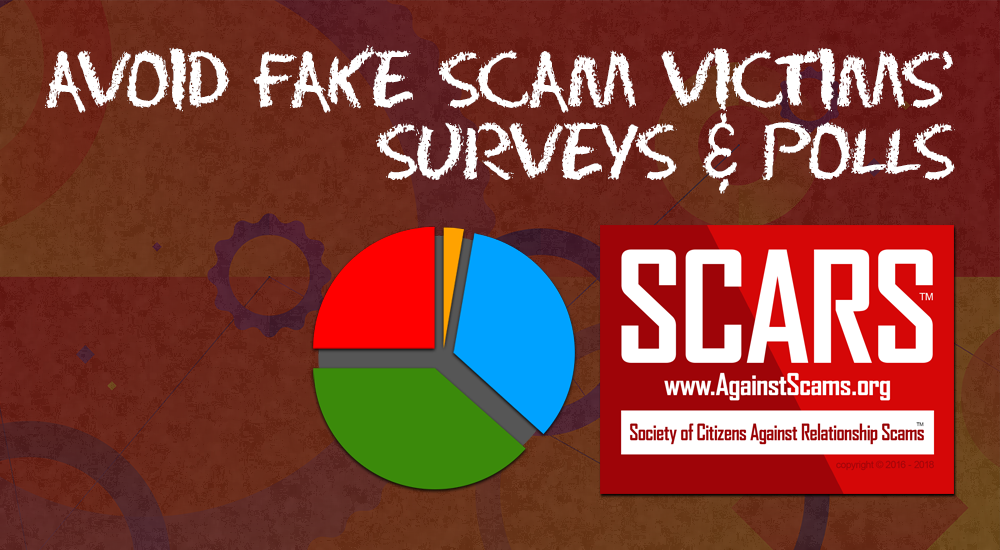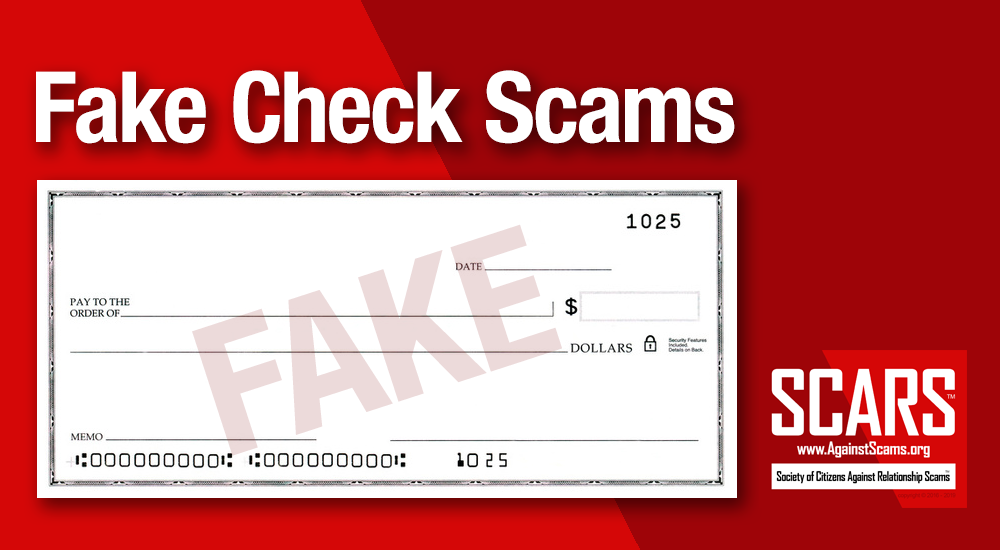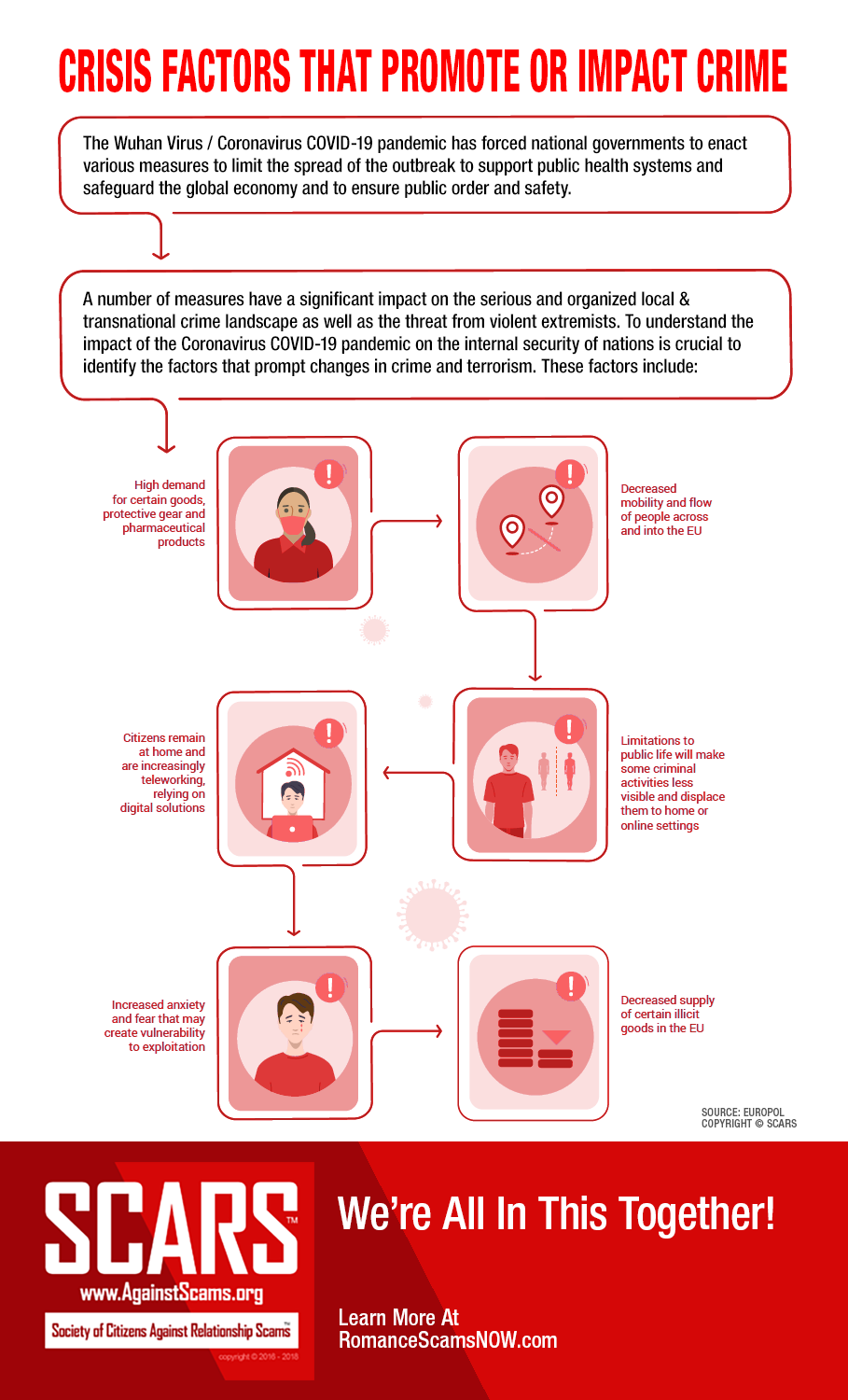
SCARS Institute’s Encyclopedia of Scams™ Published Continuously for 25 Years

SCARS™ Special Report: How Criminals Are Profiting From The Coronavirus COVID-19 Pandemic
Europol Decries The Latest Developments Of COVID-19 On The Criminal Landscape In The EU & The World
During this unprecedented crisis, governments across the globe are intensifying their efforts to combat the global spread of the coronavirus by enacting various measures to support public health systems, safeguard the economy and to ensure public order and safety.
A number of these measures have a significant impact on the serious and organized crime landscape.
Criminals have been quick to seize opportunities to exploit the crisis by adapting their modi operandi or engaging in new criminal activities. Factors that prompt changes in crime and terrorism include:
- High Demand for certain goods, protective gear and pharmaceutical products;
- Decreased Mobility and flow of people across and into the EU;
- Citizens Remain At Home and are increasingly teleworking, relying on digital solutions;
- Limitations To Public Life will make some criminal activities less visible and displace them to home or online settings;
- Increased Anxiety And Fear that may create vulnerability to exploitation;
- Decreased Supply of certain illicit goods in the EU.
The current crisis is unprecedented in the history of the European Union (EU) and the World.
NOTE: SCARS is a cybercrime affiliate of both Europol & the Council of Europe.
Following the outbreak of the COVID-19 pandemic, Member States have imposed extensive quarantine measures, including travel restrictions, limitations to public life and lockdowns.
According to Catherine De Bolle, Executive Director, Europol
“Law enforcement agencies are requested to perform their duties under any circumstances. In many cases, their responsibilities have even been extended to maintain public order and safety and to support health authorities in their work. I would like to thank our frontline health, police and other critical staff for their tireless and relentless work.”
“Needless to say, this situation also has implications on the internal security of the EU. Criminals have quickly seized the opportunities to exploit the crisis by adapting their modes of operation or developing new criminal activities. Organized crime groups are notoriously flexible and adaptable and their capacity to exploit this crisis means we need to be constantly vigilant and prepared.”
“Member States’ main focus is now on fighting the crisis from a health perspective – it is important that we support their efforts. Crime is a seriously disrupting factor and a diversion from national and EU efforts to ensure the health and safety of citizens. That is why it is relevant to reinforce the fight against crime.”
“We at Europol are in constant contact with our law enforcement partners across the EU and beyond. During this crisis, more than ever, we must continue to support law enforcement officers in the fight against organised crime and terrorism to enhance the security of European citizens.”
“The report published today provides an overview of how criminals adapt their misdeeds to the COVID-19 pandemic. It is based on information Europol receives from the EU Member States on a 24/7 basis and intends to support Member States’ law enforcement authorities in their work.”
The United States Department of Justice and the Federal Bureau of Investigation, and the Department of Homeland Security are addressing these issues in similar ways.
In May SCARS will be addressing 2,000 entities and agencies through an even sponsored by eh U.S. Department of Homeland Security.
CRISIS CRIME OVERVIEW
CYBERCRIME
The number of cyberattacks against organizations and individuals is significant and is expected to increase. Criminals have used the COVID-19 crisis to carry out social engineering attacks themed around the pandemic to distribute various malware packages.
Cybercriminals are also likely to seek to exploit an increasing number of attack vectors as a greater number of employers institute telework, working from home, and allow connections to their organizations’ (employer’s) systems.
Critical Example: The Czech Republic reported a cyberattack on Brno University Hospital which forced the hospital to shut down its entire IT network, postpone urgent surgical interventions and re-route new acute patients to a nearby hospital.
FRAUD
Fraudsters have been very quick to adapt well-known fraud schemes to capitalize on the anxieties and fears of victims throughout the crisis. These include various types of adapted versions of telephone fraud schemes, supply scams, medical supplies scams, and decontamination scams. A large number of new or adapted fraud schemes can be expected to emerge over the coming weeks are fraudsters will attempt to capitalize further on the anxieties of people across Europe and around the world.
Critical Example: An investigation supported by Europol focuses on the transfer of €6.6 million by a company to a company in Singapore in order to purchase alcohol gels and FFP3/2 masks. The goods were never received.
COUNTERFEIT AND SUBSTANDARD GOODS
The sale of counterfeit healthcare and sanitary products as well as personal protective equipment and counterfeit pharmaceutical products has increased manifold since the outbreak of the crisis. There is a risk that counterfeiters will use shortages in the supply of some goods to increasingly provide counterfeit alternatives both on- and offline.
Critical Example: Between 3-10 March 2020, over 34 000 counterfeit surgical masks were seized by law enforcement authorities worldwide as part of Operation PANGEA supported by Europol.
ORGANIZED PROPERTY CRIME
Various types of schemes involving thefts have been adapted by criminals to exploit the current situation. This includes the well-known scams involving the impersonation of representatives of public authorities and government. Commercial premises and medical facilities are expected to be increasingly targeted for organized burglaries.
Despite the introduction of further quarantine measures throughout Europe, the crime threat remains dynamic and new or adapted types of criminal activities will continue to emerge during the crisis and in its aftermath.
Critical Example: Multiple countries have reported on a similar modus operandi for theft. The perpetrators gain access to private homes by impersonating medical staff providing information material or hygiene products or conducting a “Coronavirus test”.
Europol’s Executive Director Catherine De Bolle said: “While many people are committed to fighting this crisis and helping victims, there are also criminals who have been quick to seize the opportunities to exploit the crisis. This is unacceptable: such criminal activities during a public health crisis are particularly threatening and can carry real risks to human lives. That is why it is relevant more than ever to reinforce the fight against crime. Europol and its law enforcement partners are working closely together to ensure the health and safety of all citizens”.
The European Commissioner for Home Affairs Ylva Johansson said: “I welcome this new Europol report on latest developments of COVID-19 on the criminal landscape in the EU. The EU and Member States are stepping up efforts to keep people safe: National authorities and EU Agencies like Europol and ENISA are providing valuable input into how we can tackle this challenge together. I am determined to ensure that the Commission does all in its power to support law enforcement in the face of this new threat.”
CYBERCRIME / CYBER-ENABLED CRIME
CYBERCRIME KEY FINDINGS:
- The global pandemic of COVID-19 is not only a serious health issue but also a cybersecurity risk. Criminals swiftly took advantage of the coronavirus proliferation and are abusing the demand people have for information and supplies.
- Criminals have used the COVID-19 crisis to carry out social engineering attacks, namely phishing emails through spam campaigns and more targeted attempts such as business email compromise (BEC).
- There is a long list of cyber-attacks against organizations and individuals, including phishing campaigns that distribute malware via malicious links and attachments, and execute malware and ransomware attacks that aim to profit from the global health concern.
- Information received from law enforcement partners strongly indicates increased online activity by those seeking child abuse material. This is consistent with postings in dedicated forums and boards by offenders welcoming opportunities to engage with children whom they expect to be more vulnerable due to isolation, less supervision, and greater online exposure.
- The pandemic has an impact on Darkweb operations. Certain illicit goods will become more expensive, as source materials become unavailable. Vendors on the Darkweb offer special Wuhan Virus Coronavirus goods (scam material) at discounts.
SCARS is providing a professionally curated information feed on Facebook here: https://www.facebook.com/Contagion.COVID19/
CYBERCRIME OUTLOOK:
The number of cyber-attacks is significant and expected to increase further. Cybercriminals will continue to innovate in the deployment of various malware and ransomware packages themed around the COVID-19 pandemic. They may expand their activities to include other types of online attacks.
Cybercriminals are likely to seek to exploit an increasing number of attack vectors as a greater number of employers adopt telework (working from home) and are connected to their organizations’ or employer’s systems.
In SCARS’ Opinion, this will be transformative for almost all forms of Impersonation Scams and Other Scams based upon Emergency situations. Instead of the tired old “parents died in a car crash” or “am arrested and need money” scams, we will start seeing:
- I have no money for food
- I am in a hospital and need money
- My children need money
In short, the tone and emergencies quoted will change to exploit the Coronavirus crisis worldwide and making it much more difficult to detect scams based upon the previously well-know scenarios.
CRITICAL EXAMPLE: Attack on critical health infrastructure
Cybercriminals carried out a cyber-attack on Brno University Hospital Brno, Czechia amid the COVID-19 outbreak in Europe. Since a state of emergency was declared in Czechia on 12 March 2020, the attack was considered an attack on a critical infrastructure. The incident prompted the hospital to postpone urgent surgeries and reroute new acute patients to a nearby alternative hospital. The hospital was forced to shut down its entire IT network during the incident and two of the hospital’s other branches, the Children’s Hospital and the Maternity Hospital, were also affected.
These types of attacks during a public health crisis such as the COVID-19 pandemic are particularly threatening and carry very real risks to human lives.
Learn about this here: ZDNet 2020, Czech hospital hit by cyberattack while in the midst of a COVID-19 outbreak, accessible at https://www.zdnet.com/article/czech-hospital-hit-by-cyber-attack-while-in-the-midst-of-a-covid-19-outbreak/
FRAUD
FRAUD KEY FINDINGS:
- Fraudsters have been very quick to adapt well-known fraud schemes to target individual citizens, businesses and public organizations.
- These include various types of adapted versions of telephone fraud schemes, medical supply scams, sanitation scams, supply scams, and decontamination scams.
- The activities of fraudsters will continue to target an increasing number of victims across the EU to exploit anxieties as the crisis persists.
FRAUD OUTLOOK:
Fraud linked to the current pandemic is likely highly profitable for the criminals involved and they will attempt to capitalize on the anxieties and fears of victims throughout this crisis period. A large number of new or adapted fraud and scam schemes can be expected to emerge over the coming weeks and months with the potential for substantial financial damage to citizens, businesses and public organizations.
Criminals have also adapted investment scams to elicit speculative investments in stocks related to COVID-19 with promises of substantial profits.
The emergence of new fraud schemes and a further increase in the number of victims targeted can be expected. Even when the current crisis ends, criminals are likely to adapt fraud schemes in order to exploit the post-pandemic situation.
CRITICAL EXAMPLE: Supply Scams
Businesses seeking to purchase supplies such as protective masks and other equipment are being targeted by scammers. A Member State’s investigation focused on the transfer of €6.6 million from a company to another company in Singapore to purchase alcohol gels and FFP2 and FFP3 masks. The goods were never received. In another case reported by a Member State, a company
attempted to purchase 3.85 million masks and lost €300 000. Similar supply scams of sought-after products have been reported by other countries.
COUNTERFEIT & SUB-STANDARD GOODS
COUNTERFEIT & SUB-STANDARD GOODS KEY FINDINGS
- The distribution of counterfeit and/or sub-standard goods has been a key area of criminal activity in relation to the COVID-19 pandemic both inside of China and around the rest of the world.
- The sale of counterfeit healthcare and sanitary products as well as personal protective equipment (PPE) and counterfeit pharmaceutical products has increased manifold since the outbreak of the crisis. The advertisement and sale of these items take place both on and offline. These actions are actually killing people around the world.
- Some developments, such as the distribution of fake corona home testing kits, are particularly worrying from a public health perspective.
- Recently it was learned that even approved products can be poorly made and represent a scam – as was the case with Chinese-made testing kits that are over 30% defective!
COUNTERFEIT & SUB-STANDARD GOODS OUTLOOK
The sale of counterfeit and/or sub-standard goods on and offline is booming in the pandemic economy. There is a particularly high demand for certain types of healthcare and sanitary products (masks, gloves, cleaning products, pharmaceutical products, and testing kits), which has created a substantial market for product counterfeiters, fraudsters and profiteers.
The number of offers of counterfeit and sub-standard goods will continue to increase, particularly online. There is a risk that counterfeiters will use shortages in the supply of some goods to increasingly provide counterfeit alternatives both on and offline. This may entail sub-standard or counterfeit foods, hygiene items, and other everyday goods.
CRITICAL EXAMPLE: Criminals take advantage of the high demand in hygiene products driven by the COVID-19 outbreak
Europol supported a global operation to target trafficking counterfeit medicines. Operation Pangea, coordinated by INTERPOL and involved 90 countries worldwide, took place between the 3rd to the 10th of March 2020. The pandemic has opened up a business opportunity for predatory criminals. Authorities around the world seized nearly 34,000 counterfeit surgical masks, the most commonly sold medical product online right now. Law enforcement officers identified more than 2,000 links to products related to COVID-19 – but there are likely tens of thousands more. The results of the operation revealed a worrying increase in unauthorized antiviral medications and the antimalarial chloroquine. Vitamin C, known for its immune-boosting properties, and other food supplements have been seized around the world. Painkillers and antibiotics also represented a significant portion of the seizures.
THE EUROPOL OPERATION IN NUMBERS (as of March 10, 2020):
- 121 arrests
- €13 million in potentially dangerous pharmaceuticals seized
- 32,600 packages inspected
- 48,000 packages seized
- 4.4 million units of illicit pharmaceuticals seized worldwide
- 37,000 unauthorized and counterfeit medical devices seized (mostly surgical masks and self-testing kits for HIV and glucose monitoring)
- 2,500 links taken down (websites, social media, online marketplaces, adverts)
- 37 organized crime groups dismantled
More on this: Europol 2020, Criminals take advantage of the high demand in hygiene products driven by the COVID-19 outbreak, accessible at https://www.europol.europa.eu/newsroom/news/rise-of-fake-%E2%80%98corona-cures%E2%80%99-revealed-in-global-counterfeit-medicine-operation
ORGANIZED PROPERTY CRIME
ORGANIZED PROPERTY CRIME KEY FINDINGS
- Various types of schemes involving thefts associated with organized property crime have been adapted by criminals to exploit the current situation. This includes the well-known ‘nephew’ or ‘grandchild’ trick and scams involving the impersonation of representatives of public authorities.
- Commercial premises and medical facilities are expected to be increasingly targeted for organized burglaries.
- The level of activity of criminals involved in organized property crime is expected to further increase during the crisis.
ORGANIZED PROPERTY CRIME OUTLOOK
The same types of thefts using deception encountered during the COVID-19 crisis have existed before, but criminals have adapted their modi operandi to the current situation. The number of attempts involving these types of thefts and scams is likely to increase across the EU. While all EU citizens are at risk of being victimized, it appears certain fraud schemes are particularly targeting vulnerable members of society, such as the elderly. Fraudsters also approach victims at home by pretending to be law enforcement or healthcare officials offering testing for COVID-19 and other pretenses to enter homes and steal valuables.
CRITICAL EXAMPLE: Faking and Entering
Multiple countries have reported a similar modus operandi for theft. The perpetrators gain access to private homes by impersonating medical staff or government agencies providing information material or hygiene products or conducting a ‘coronavirus test’. There a reported case where the perpetrators called the victim to inform them that a relative is infected and in hospital, then they claimed that doctors would have to come and take an immediate ‘COVID-19 test’. These fake doctors came to the victim’s home in protective clothing and masks in the middle of the night. The suspects then took an apparent swab sample from the victim’s mouth and wiped his forearms with apparent strips of paper to test it. He was then told that the evaluation of the test would take about five hours, but they needed a substantial payment or just used it as an excuse to enter and rob.
OTHER CRIMINAL ACTIVITIES
OTHER CRIMINAL ACTIVITIES KEY FINDINGS:
- It is difficult to assess the short-term impact of the current pandemic crisis on drug markets, but it is likely to shift supply-demand dynamics and may disrupt legal supply channels creating new ILLEGAL supply channels. Some reporting indicates stockpiling of certain drugs by consumers and supply shortages in precursors and essential chemicals used in drug production in around the world, which will likely impact on production output and prices. This area requires careful monitoring as supply shortages have the potential to translate into an increase in the number of incidents of drug-related violence between rival suppliers and distributors. It can also have an adverse impact on public health.
- Migrant smuggling has been a key security and humanitarian challenge to many countries over the last five years and remains so during the COVID-19 pandemic crisis. There is likely to be increased demand for services of migrant smuggling networks to enter the EU or the United States to make secondary movements to circumvent the enhanced border control measures currently in place throughout the EU and USA.
- There are some concerns that the closure of establishments offering legal sex work may increase the number of incidents of sexual exploitation.
PORTIONS SOURCED FROM EUROPOL
TAGS: SCARS, Important Article, Information About Scams, Anti-Scam, Scams, Scammers, Fraudsters, Cybercrime, Crybercriminals, Romance Scams, Scam Victims, Transnational Criminals, Organized Crime, Global Crime Analysis,
SCARS™ Editorial Team
Society of Citizens Against Relationship Scams Inc.
A Worldwide Crime Victims Assistance Nonprofit Organization
Visit: www.AgainstScams.org
Contact Us: Contact@AgainstScams.org
PLEASE SHARE OUR ARTICLES WITH YOUR FRIENDS & FAMILY
HELP OTHERS STAY SAFE ONLINE – YOUR KNOWLEDGE CAN MAKE THE DIFFERENCE!
The Latest SCARS Posts:
FIND MORE SCAM NEWS
«SCAMCRIME.COM»
JOIN US ON FACEBOOK
«CLICK HERE»
END
MORE INFORMATION
– – –
Tell us about your experiences with Romance Scammers in our
« Scams Discussion Forum on Facebook »
– – –
FAQ: How Do You Properly Report Scammers?
It is essential that law enforcement knows about scams & scammers, even though there is nothing (in most cases) that they can do.
Always report scams involving money lost or where you received money to:
- Local Police – ask them to take an “informational” police report – say you need it for your insurance
- U.S. State Police (if you live in the U.S.) – they will take the matter more seriously and provide you with more help than local police
- Your National Police or FBI « www.IC3.gov »
- The SCARS|CDN™ Cybercriminal Data Network – Worldwide Reporting Network on « www.Anyscam.com »
This helps your government understand the problem, and allows law enforcement to add scammers on watch lists worldwide.
– – –
To learn more about SCARS visit « www.AgainstScams.org »
Please be sure to report all scammers
on « www.Anyscam.com »
Disclaimer:
SCARS IS A DIGITAL PUBLISHER AND DOES NOT OFFER HEALTH OR MEDICAL ADVICE, LEGAL ADVICE, FINANCIAL ADVICE, OR SERVICES THAT SCARS IS NOT LICENSED OR REGISTERED TO PERFORM.
IF YOU’RE FACING A MEDICAL EMERGENCY, CALL YOUR LOCAL EMERGENCY SERVICES IMMEDIATELY, OR VISIT THE NEAREST EMERGENCY ROOM OR URGENT CARE CENTER. YOU SHOULD CONSULT YOUR HEALTHCARE PROVIDER BEFORE FOLLOWING ANY MEDICALLY RELATED INFORMATION PRESENTED ON OUR PAGES.
ALWAYS CONSULT A LICENSED ATTORNEY FOR ANY ADVICE REGARDING LEGAL MATTERS.
A LICENSED FINANCIAL OR TAX PROFESSIONAL SHOULD BE CONSULTED BEFORE ACTING ON ANY INFORMATION RELATING TO YOUR PERSONAL FINANCES OR TAX RELATED ISSUES AND INFORMATION.
This content and other material contained on the website, apps, newsletter, and products (“Content”), is general in nature and for informational purposes only and does not constitute medical, legal, or financial advice; the Content is not intended to be a substitute for licensed or regulated professional advice. Always consult your doctor or other qualified healthcare provider, lawyer, financial or tax professional with any questions you may have regarding the educational information contained herein. SCARS makes no guarantees about the efficacy of information described on or in SCARS’s Content. The information contained are subject to change and are not intended to cover all possible situations or effects. SCARS does not recommend or endorse any specific professional or care provider, product, service, or other information that may be mentioned in SCARS’s websites, apps, and Content unless explicitly identified as such.
The disclaimers herein are provided on this page for ease of reference. These disclaimers supplement and are a part of SCARS’s websites Terms of Use.
Legal Notices:
All original content is Copyright © 1991 – 2020 Society of Citizens Against Relationship Scams Inc. (D.B.A SCARS) All Rights Reserved Worldwide & Webwide. Third-party copyrights acknowledge.
SCARS, SCARS|INTERNATIONAL, SCARS, SCARS|SUPPORT, SCARS, RSN, Romance Scams Now, SCARS|WORLDWIDE, SCARS|GLOBAL, SCARS, Society of Citizens Against Relationship Scams, Society of Citizens Against Romance Scams, SCARS|ANYSCAM, Project Anyscam, Anyscam, SCARS|GOFCH, GOFCH, SCARS|CHINA, SCARS|CDN, SCARS|UK, SCARS|LATINOAMERICA, SCARS|MEMBER, SCARS|VOLUNTEER, SCARS Cybercriminal Data Network, Cobalt Alert, Scam Victims Support Group, are all trademarks of Society of Citizens Against Relationship Scams Inc.
Contact the law firm for the Society of Citizens Against Relationship Scams Incorporated by email at legal@AgainstScams.org
-/ 30 /-
What do you think about this?
Please share your thoughts in a comment below!
Table of Contents
- Europol Decries The Latest Developments Of COVID-19 On The Criminal Landscape In The EU & The World
- CYBERCRIME
- FRAUD
- COUNTERFEIT AND SUBSTANDARD GOODS
- ORGANIZED PROPERTY CRIME
- CYBERCRIME KEY FINDINGS:
- CYBERCRIME OUTLOOK:
- FRAUD KEY FINDINGS:
- FRAUD OUTLOOK:
- COUNTERFEIT & SUB-STANDARD GOODS KEY FINDINGS
- COUNTERFEIT & SUB-STANDARD GOODS OUTLOOK
- ORGANIZED PROPERTY CRIME KEY FINDINGS
- ORGANIZED PROPERTY CRIME OUTLOOK
- OTHER CRIMINAL ACTIVITIES KEY FINDINGS:
- Virtual Kidnapping & Extortion – Proof of Life Images or Videos – 2026
- Fake Money Recovery Law Firms – 2026
- Money Laundering Drop Accounts – 2026
- 7 Deadly Sins of Post Scam Victim Vulnerability – 2023 UPDATED 2026
- United States Scam Center Strike Force – 2025 – VIDEO
- The Scam States of Southeast Asia – 2025-2026
LEAVE A COMMENT?
Recent Comments
On Other Articles
- velma faile on Finally Tax Relief for American Scam Victims is on the Horizon – 2026: “I just did my taxes for 2025 my tax account said so far for romances scam we cd not take…” Feb 25, 19:50
- on Reporting Scams & Interacting With The Police – A Scam Victim’s Checklist [VIDEO]: “Yes, this is a scam. For your own sanity, just block them completely.” Feb 25, 15:37
- on Danielle Delaunay/Danielle Genevieve – Stolen Identity/Stolen Photos – Impersonation Victim UPDATED 2024: “She goes by the name of Sanrda John now” Feb 25, 10:26
- on Reporting Scams & Interacting With The Police – A Scam Victim’s Checklist [VIDEO]: “So far I have not been scam out of any money because I was aware not to give the money…” Feb 25, 07:46
- on Love Bombing And How Romance Scam Victims Are Forced To Feel: “I was love bombed to the point that I would do just about anything for the scammer(s). I was told…” Feb 11, 14:24
- on Dani Daniels (Kira Lee Orsag): Another Scammer’s Favorite: “You provide a valuable service! I wish more people knew about it!” Feb 10, 15:05
- on Danielle Delaunay/Danielle Genevieve – Stolen Identity/Stolen Photos – Impersonation Victim UPDATED 2024: “We highly recommend that you simply turn away form the scam and scammers, and focus on the development of a…” Feb 4, 19:47
- on The Art Of Deception: The Fundamental Principals Of Successful Deceptions – 2024: “I experienced many of the deceptive tactics that romance scammers use. I was told various stories of hardship and why…” Feb 4, 15:27
- on Danielle Delaunay/Danielle Genevieve – Stolen Identity/Stolen Photos – Impersonation Victim UPDATED 2024: “Yes, I’m in that exact situation also. “Danielle” has seriously scammed me for 3 years now. “She” (he) doesn’t know…” Feb 4, 14:58
- on An Essay on Justice and Money Recovery – 2026: “you are so right I accidentally clicked on online justice I signed an agreement for 12k upfront but cd only…” Feb 3, 08:16
ARTICLE META
Important Information for New Scam Victims
- Please visit www.ScamVictimsSupport.org – a SCARS Website for New Scam Victims & Sextortion Victims
- Enroll in FREE SCARS Scam Survivor’s School now at www.SCARSeducation.org
- Please visit www.ScamPsychology.org – to more fully understand the psychological concepts involved in scams and scam victim recovery
If you are looking for local trauma counselors please visit counseling.AgainstScams.org or join SCARS for our counseling/therapy benefit: membership.AgainstScams.org
If you need to speak with someone now, you can dial 988 or find phone numbers for crisis hotlines all around the world here: www.opencounseling.com/suicide-hotlines
A Note About Labeling!
We often use the term ‘scam victim’ in our articles, but this is a convenience to help those searching for information in search engines like Google. It is just a convenience and has no deeper meaning. If you have come through such an experience, YOU are a Survivor! It was not your fault. You are not alone! Axios!
A Question of Trust
At the SCARS Institute, we invite you to do your own research on the topics we speak about and publish, Our team investigates the subject being discussed, especially when it comes to understanding the scam victims-survivors experience. You can do Google searches but in many cases, you will have to wade through scientific papers and studies. However, remember that biases and perspectives matter and influence the outcome. Regardless, we encourage you to explore these topics as thoroughly as you can for your own awareness.
Statement About Victim Blaming
SCARS Institute articles examine different aspects of the scam victim experience, as well as those who may have been secondary victims. This work focuses on understanding victimization through the science of victimology, including common psychological and behavioral responses. The purpose is to help victims and survivors understand why these crimes occurred, reduce shame and self-blame, strengthen recovery programs and victim opportunities, and lower the risk of future victimization.
At times, these discussions may sound uncomfortable, overwhelming, or may be mistaken for blame. They are not. Scam victims are never blamed. Our goal is to explain the mechanisms of deception and the human responses that scammers exploit, and the processes that occur after the scam ends, so victims can better understand what happened to them and why it felt convincing at the time, and what the path looks like going forward.
Articles that address the psychology, neurology, physiology, and other characteristics of scams and the victim experience recognize that all people share cognitive and emotional traits that can be manipulated under the right conditions. These characteristics are not flaws. They are normal human functions that criminals deliberately exploit. Victims typically have little awareness of these mechanisms while a scam is unfolding and a very limited ability to control them. Awareness often comes only after the harm has occurred.
By explaining these processes, these articles help victims make sense of their experiences, understand common post-scam reactions, and identify ways to protect themselves moving forward. This knowledge supports recovery by replacing confusion and self-blame with clarity, context, and self-compassion.
Additional educational material on these topics is available at ScamPsychology.org – ScamsNOW.com and other SCARS Institute websites.
Psychology Disclaimer:
All articles about psychology and the human brain on this website are for information & education only
The information provided in this article is intended for educational and self-help purposes only and should not be construed as a substitute for professional therapy or counseling.
While any self-help techniques outlined herein may be beneficial for scam victims seeking to recover from their experience and move towards recovery, it is important to consult with a qualified mental health professional before initiating any course of action. Each individual’s experience and needs are unique, and what works for one person may not be suitable for another.
Additionally, any approach may not be appropriate for individuals with certain pre-existing mental health conditions or trauma histories. It is advisable to seek guidance from a licensed therapist or counselor who can provide personalized support, guidance, and treatment tailored to your specific needs.
If you are experiencing significant distress or emotional difficulties related to a scam or other traumatic event, please consult your doctor or mental health provider for appropriate care and support.
Also read our SCARS Institute Statement about Professional Care for Scam Victims – click here to go to our ScamsNOW.com website.
























Thank you for your comment. You may receive an email to follow up. We never share your data with marketers.